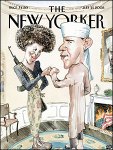Watching a CNN special on John McCain yesterday I was reminded of my grandfather and a conversation I had with him shortly before he passed away. He had been trying to read Thomas Friedman’s The World is Flat, but ultimately gave it up because, as he said, “it wasn’t for his generation.”
Seeing friends, acquaintances, and fellow soldiers recall the young McCain, I couldn’t help but think of my grandpa, an East Coaster who for decades ran a successful business on Wall Street, a Renaissance man of the Twentieth Century. He just couldn’t (or wouldn’t) wrap his head around a book sub-titled A Brief History of the Twenty-First Century, about a new global era and how it came to be.
My grandfather taught me a great deal. He had deeply ingrained values that made him a respected and admired person in whatever circles he found himself in, and I take those lessons to heart. But he was also a man of his time, and though he tried to blend into this new century, his spirit was forever a part of the past.
No doubt McCain was a valorous soldier and an honorable man, but he is a man of another era, like my grandfather shaped by a world that in many ways is far different than the one towards which we are now heading.
Filed under: America, Opinion, Politics | Tagged: America, CNN, elections, globalization, McCain, Politics, president | Leave a comment »













